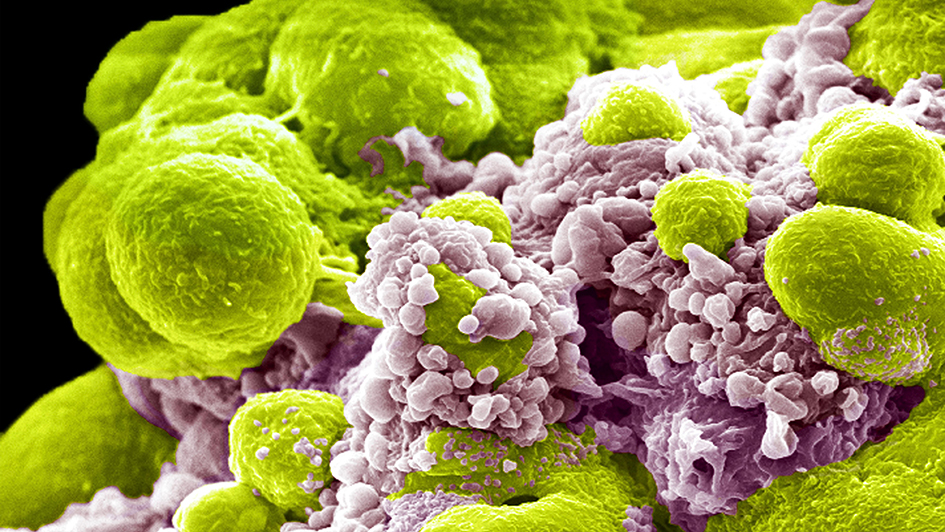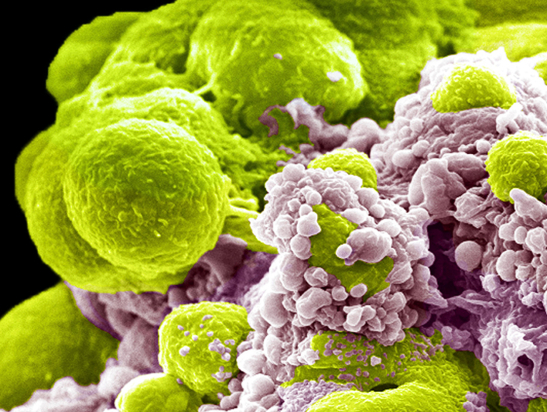
Image: Prostate cancer cells treated with nano sized drug carriers. Credit: Khuloud T. Al-Jamal & Izzat Suffian, Wellcome Collection. CC BY 4.0
Genetic screening for prostate cancer in GP surgeries could be effective at picking up otherwise undiagnosed cases of the disease, a new pilot study shows.
Researchers ‘barcoded’ men for their genetic risk of prostate cancer by testing each for 130 DNA changes – and gave those at higher risk follow-up checks.
Their study found that population screening was safe and feasible, and identified new prostate cancers in over a third of apparently healthy men who were found to have the highest levels of inherited risk.
The pilot was the first ever in the UK to assess genetic screening for prostate cancer in the general population, and will now be followed by a larger-scale study that could prove the potential of a new screening programme for the disease.
The Institute of Cancer Research, London, and The Royal Marsden NHS Foundation Trust worked with GPs to invite more than 300 healthy Caucasian men aged 55-69 to participate in screening. The findings of the pioneering study were presented on Friday at the American Society of Clinical Oncology (ASCO) virtual annual meeting.
The study was funded by the European Research Council with additional support from Cancer Research UK and the National Institute for Health Research.
Many scientists from The Institute of Cancer Research, London are attending the virtual 2020 ASCO conference. See all of our news and blog posts from the event.
Identifying those at the highest level of risk
The researchers collected DNA from saliva samples of 307 men and looked at for more than 130 genetic changes that can influence the risk of developing prostate cancer, each by a small amount.
They combined the effects of the genetic changes to assign each man an overall risk score. This in turn allowed men to be placed in different risk bands depending on how their level of risk compared with others in the population.
Men in the top 10 per cent of risk – 26 out of the 307 – were selected for screening and contacted by the researchers. Of these, 18 men accepted and underwent an MRI scan and a biopsy, and of these 18 apparently healthy men, seven were diagnosed with prostate cancer.
The good level of uptake among men and effectiveness at detecting undiagnosed disease show that population screening is possible and could be reproduced on an even larger scale.
Researchers also looked at how aggressive the cancers of those within the top 10 per cent of the genetic score were. All seven prostate cancers turned out to be manageable by active surveillance, with a mean prostate-specific antigen (PSA) score of 1.8 – a level between 0 and 2.5 is considered safe.
'Improve diagnosis and ultimately save lives'
Now that the initiative has been shown to be feasible, a full pilot study, called BARCODE-1, is ready to be launched. This study will involve 5,000 patients from 70 GP practices, and aims to provide a definitive answer on the potential role of population genetic screening for improving detection of prostate cancer.
Researchers believe that genetic screening could detect potentially aggressive cancers more effectively than PSA testing – which is controversial because of its high rates of over-diagnosis.
Study leader Professor Ros Eeles, Professor of Oncogenetics at The Institute of Cancer Research, London, and Consultant in Clinical Oncology and Oncogenetics at The Royal Marsden NHS Foundation Trust, said:
“A man’s risk of prostate cancer is determined in part by which combination of at least 170 different genetic changes they happen to inherit.
"Our pilot study assessed men’s genetic risk by testing for more than 130 genetic changes that have been linked to prostate cancer. We showed that genetic barcoding of men can safely and effectively identify those at the highest level of risk for prostate cancer, so they can be targeted for follow-up checks.
“We were able to identify prostate cancers in over a third of the 18 apparently healthy men who we found to have the highest levels of inherited risk. Our hope is that the larger BARCODE-1 pilot study will now be able to definitively show that population genetic screening for prostate cancer can cost-effectively improve diagnosis and ultimately save lives.”
Our researchers are renowned for their success in improving treatments for men with prostate cancer. Rob was diagnosed with prostate cancer in 2012, and thanks to abiraterone – a drug discovered and developed by the ICR – he's been living well with cancer for seven and a half years.
'Safe, feasible and potentially effective'
Professor Paul Workman, Chief Executive of The Institute of Cancer Research, London, said:
“It’s vital that we find ways of putting our increased knowledge of the genetics and biology of cancer to work not only to find new treatments, but also to identify targeted methods for early detection of the disease.
“This is an exciting early pilot study which for the first time in the UK demonstrates that genetic screening for prostate cancer is safe, feasible and potentially effective. It’s great to see that this research is now progressing into a larger-scale pilot, which if successful could show the potential of genetic screening to be a life-saver.”
Patient Remy Smits, 59, said:
“I signed up for the trial after seeing the details advertised at my local GP Practice. Although I met all the criteria for joining, I did not think I would be in the high-risk group. I had a PSA test not long before joining the trial and it was relatively low (2.1) so I was quite surprised when I got called back for further investigations. I had another PSA test, followed by an MRI scan and then finally a biopsy where they detected cancer the size of a grain of sand which is quite remarkable.
“I have been put under ‘active surveillance’ and come into clinic at The Royal Marsden every six months for repeat PSA testing and MRI scans.
“Whilst the realisation that I have cancer came as a shock; I feel better knowing that it has been identified at a very early stage. I also feel that I am now in a much better position to make an informed decision about any future treatment options. I also like the fact that being part of this trial will make a difference for many men in the future.”
Professor David Cunningham, Director of Clinical Research at The Royal Marsden, said:
“Earlier and faster diagnosis is often the key to successfully treating cancer. Using genetic screening for men most at risk for prostate cancer will mean we have a much greater chance of being able to treat the disease successfully at an earlier stage, often with less invasive procedures and fewer long-term side effects.”
